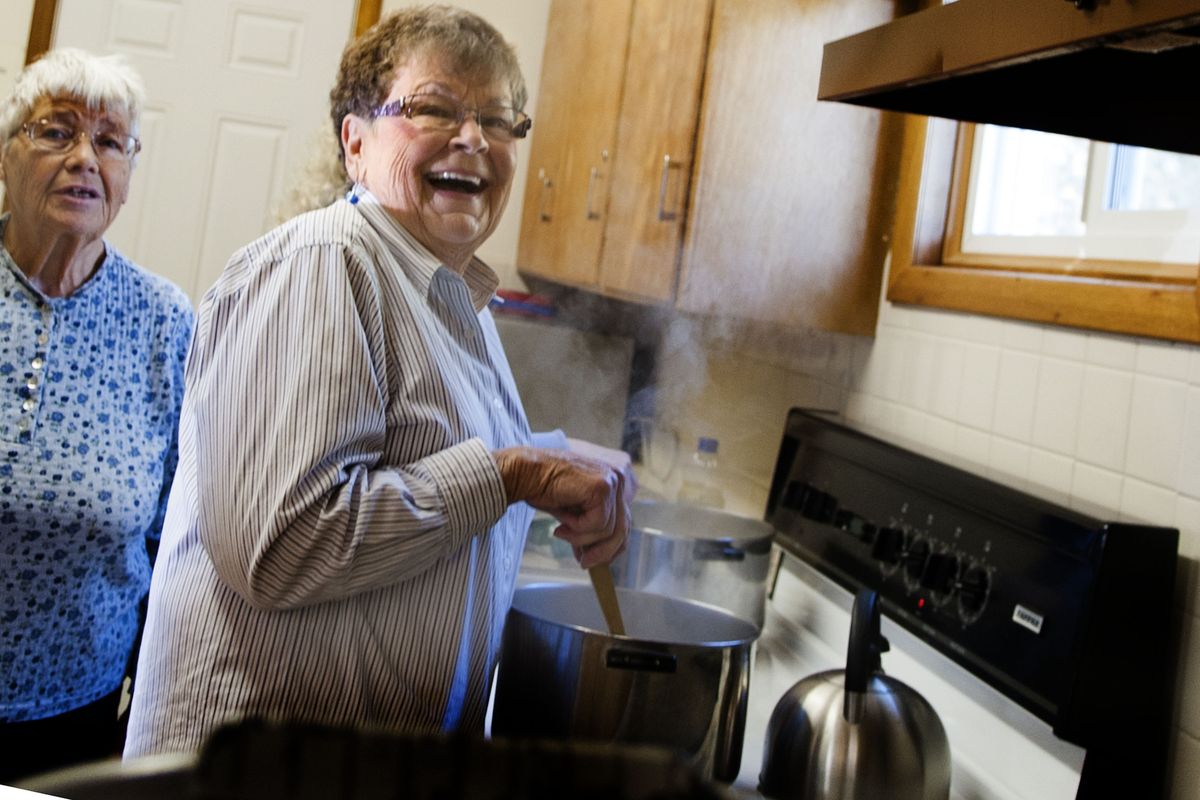Tri-Community Grange tries to cultivate new crop of members

By 3 p.m. Friday, Tri-Community Grange volunteers in Newman Lake had prepared close to 30 pounds of spaghetti noodles, 25 loaves of garlic bread and multiple homemade desserts.
Grange members preparing the annual spaghetti feed fundraiser hoped it won’t be the last. Along with plates piled high, they handed out fliers last week with the message that the Grange hall is in danger of closing because of a lack of funds and enough people to lead activities.
Fifteen years ago the Tri-Community Grange was 150 members strong. But now it has close to 30 members with a roster shrinking rapidly, said President Loren Morgan. He said many of the leaders who remain active are getting old and don’t have the energy to run it anymore. Others have died.
“We’re within a year of being forced to close,” said Morgan, who at 63 is one of the youngest members. “It isn’t just a question of the cost, it’s also having the members to hold the offices and do the work.”
He added, “We need 15 new members at a minimum just to fill the board positions, and more would be better.”
Located along Starr Road just a block north of Trent Avenue, the Grange draws members from Newman Lake, East Farms, Otis Orchards and Greenacres. Among about 17 Granges in Spokane County, the halls are part of a nearly 150-year-old organization with agricultural roots that provides a gathering place and political voice for rural residents.
Past Granges worked to gain fair shipping costs for crops, rural postal delivery, and telephone service.
Today, the Tri-Community hall is used regularly by groups such as Boy Scout Troop 490, a 4-H club, and the Newman Lake Property Association. With a kitchen, wood floor and small stage, the hall also holds a Sunday dance group, wedding receptions, family reunions, and other community gatherings.
Mary Alice Jones, 72, is the grange’s treasurer and a member for nearly 40 years. She said if the Grange ceases to operate, the hall reverts back to the state organization, which likely will sell it.
“They’re not in the position to run it,” Jones said. “It would be gone, and that’s why us older ones have hung on. We hated to see that taken away from the community. We felt there wasn’t anywhere else for people to meet.”
An email circulated earlier this fall about the Grange’s difficulties drew a handful of new recruits, including Jeanne Englund, 65, who joined last month with her husband. She helped at Friday’s dinner.
“We want to help keep this place alive,” Englund said. “We’re retired, and we have the time.”
Another new member, 63-year-old Kathy Peterson, was heating up spaghetti noodles.
“This place has just so many memories,” Peterson said. “I think it’s an important place for a sense of community.”
The Newman Lake hall was built in the 1960s, although the Grange existed in another structure going back to at least the 1930s, Morgan said.
The building is used as a base for an annual community cleanup day. Members have opened up the hall during emergencies including the 1991 firestorm, the 1996 ice storm, and floods. For years, the Grange has bought dictionaries distributed as a donation to third-graders at East Farms Elementary.
Tammy Fuller, principal at East Farms STEAM Magnet School, volunteered to help at the spaghetti feed.
“These guys will never tell you how much they do, and they’re all interconnected with the fire department, the auxiliary, and with the schools,” she said. “They give and give and give.”
Interim East Valley Superintendent Tom Gresch, who washed dishes at the Friday dinner, had memories of the Grange as a child. “The Grange has always been a huge part of the community,” he said.
Boy Scouts also volunteer annually to serve at the spaghetti feed, and members help do yard work.
Jones said private parties rent the hall for $125, but bookings have declined. Meanwhile, the Grange has expenses such as utilities, property taxes, insurance and building upkeep. A furnace system replacement last year cost $8,000 and wiped out the Grange’s savings, she said.
It’s time for younger people to act and decide the Grange’s future role in the community, Jones added.
“We’re all getting older, so we can’t do all these fundraisers anymore; physically we just can’t,” she said.
“We’re kind of getting to the end of what we’re doing and what we’ve done in the past. People in their 40s, 50s, 60s, they’ve got to decide what they want to do to raise money to keep the hall open, if that’s what they want to do.”